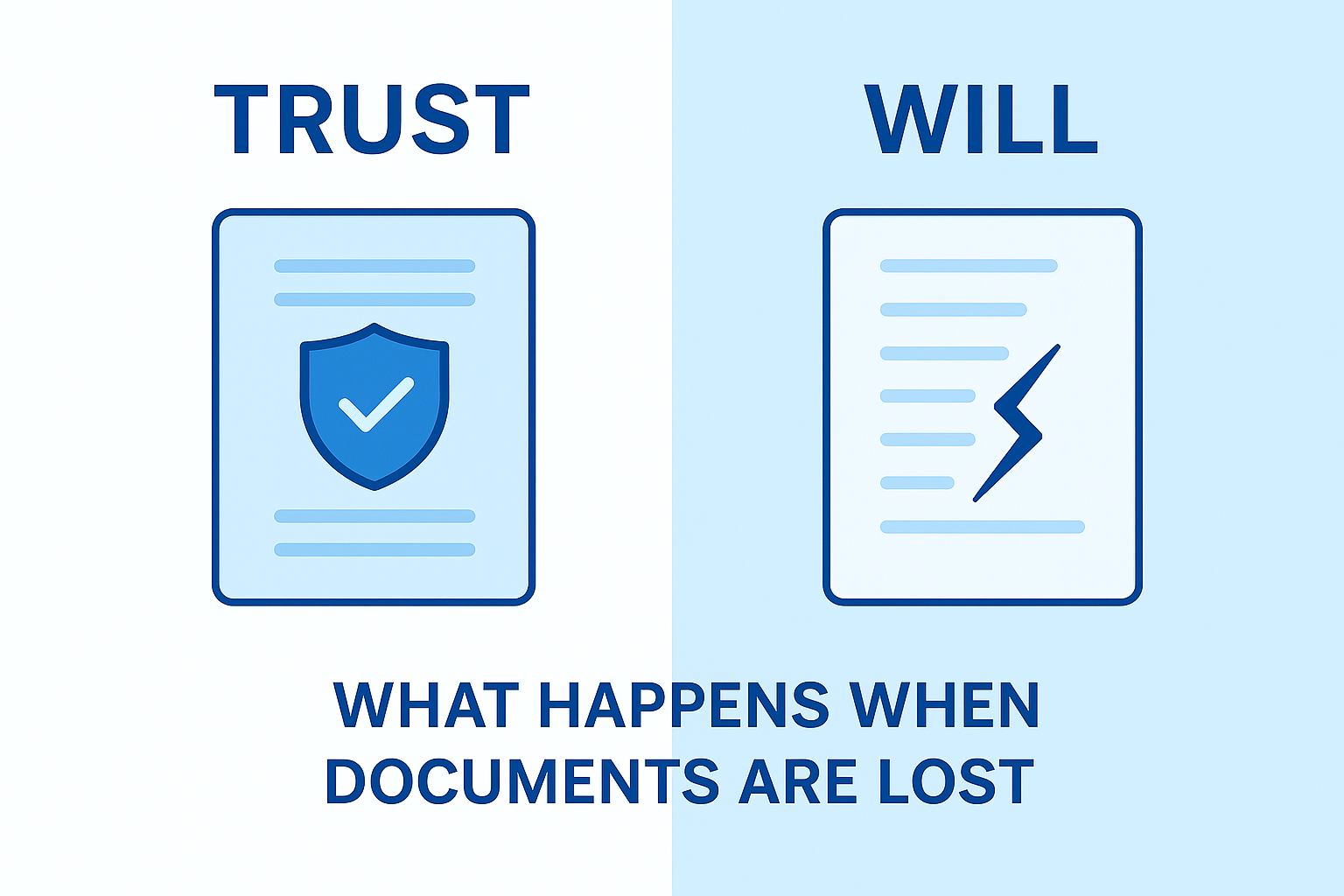In estate planning, the paper you lose determines the outcome you get.
When clients think about “losing estate documents,” they often picture chaos — assets frozen, plans destroyed, and endless court battles. But the truth is more nuanced.
If you lose your original Trust, it’s usually not a legal disaster.
If you lose your original Will, however, it can be.
Here’s why that distinction matters, and why it’s one more reason that having a Trust can offer extra peace of mind.
Losing a Trust Document: Inconvenient, But Not Catastrophic
If you can’t locate the original signed Trust, don’t panic. As long as a copy exists, it remains valid and enforceable.
A Trust is considered a living document — it becomes effective the moment it’s signed and funded. The assets titled in the name of the Trust are already under the Trustee’s control, and a verified copy of the Trust is typically sufficient for banks, title companies, and other institutions to continue honoring it.
So, even if the original version is misplaced:
- The Trustee can still distribute assets and manage the Trust.
- Financial institutions will generally accept a clear copy as proof of authority.
- Your wishes remain intact, and no court process is automatically triggered.
The only real concern is if no copy of the Trust exists anywhere — not with you, your lawyer, or your Trustee. In that case, the issue isn’t about “validity,” but about uncertainty: no one knows what the Trust said or how it was meant to operate. That’s why keeping at least one copy safely stored is still essential.
Losing a Will: A Very Different Story
Losing the original Will, on the other hand, is a much bigger problem — particularly in New York.
Under state law, if the original signed Will cannot be located after a person’s death, there is a legal presumption that it was intentionally destroyed or revoked. That means:
- The copy of the Will is not automatically valid.
- The court will likely refuse to accept a copy unless strict proof shows it wasn’t revoked.
- The estate may default to intestacy, where assets are distributed according to state law — not the person’s actual wishes.
This rule often surprises families who think that having a scanned or photocopied Will is enough. Unfortunately, it isn’t. Without the original, there’s a strong chance your carefully planned estate will be treated as if you died without a Will at all.
Why This Matters — and Why Trusts Provide Extra Protection
This key difference is one of the many reasons estate planners often recommend including a Revocable Living Trust as part of a comprehensive plan.
Trusts offer protection against exactly this kind of risk.
- If the original Trust is lost but a copy exists: it’s still valid, and administration continues smoothly.
- If the original Will is lost: it’s presumed revoked, and your wishes may never be carried out.
In addition, Trusts allow you to:
- Avoid probate entirely, keeping your affairs private.
- Ensure faster access to funds for loved ones.
- Reduce the likelihood of court challenges or confusion.
In other words, a Trust provides built-in stability, even when life (or paperwork) gets messy.
Protect Your Planning
At Sverdlov Law, PLLC, we always remind clients that completing the Trust is just the beginning. Safekeeping is equally important. We recommend that clients:
- Keep digital copies securely with their attorney for reference
- Ensure that successor trustees and executors know where these documents are kept
- Review the location of their estate documents every few years, especially after moving or updating their plan
If you can’t locate your original Trust or need guidance on how to safeguard your estate plan, our team can help you organize, re-establish, and securely preserve your records — so your plan works exactly as intended.
Contact Sverdlov Law PLLC today at www.sverdlovlaw.com or 212-709-8112 or book a time on our calendar https://calendly.com/rochelle-sverdlovlaw/15min for a FREE evaluation of your case and get started with a plan tailored to your family’s needs.
This information is provided as a general overview and does not constitute legal advice. For personalized guidance, consult a New York special needs attorney.


